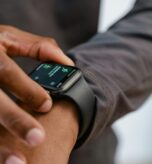
Written by Joseph Mutura Kuria and Christine Ger Ochola
Picture this! It was a very warm night, you struggled with sleep. You wake up feeling unusually irritable, skip your morning run, and instead spend extra time scrolling through your phone. Your fitness app records your inactivity, while your WhatsApp status hints at a dip in the mood. Later in the day, a notification pops up from your health app: “How are you feeling? It’s been a long time since your last therapy session. Would you like to schedule one?” Or perhaps it’s even smarter enough to have already booked a session for you.
Data science is revolutionizing personal health management by integrating diverse data points, physical activity, mental health indicators, and social habits. This approach allows individuals and healthcare providers to anticipate and address health issues before they escalate. The ability to collect, harmonize, and analyze large and diverse datasets is driving a paradigm shift in how we approach healthcare delivery, research, and public health policy formulation.
Health is more than just clinical metrics; it’s a product of physical activity, diet, mental well-being, socioeconomic conditions, environmental, and genetic factors. These are mirrored by mobile devices, wearable technologies, social media platforms, genomic data, climate data, and pandemic response data, among other dimensions. By combining wearable health data with genomic insights, socioeconomic indicators, climate data, and pandemic response data, we can identify at-risk populations, design targeted interventions, and optimize resource allocation.
Automating data flow for analysis and prediction is essential to unlock the full potential of these datasets. Automated pipelines enable real-time data ingestion, cleaning, and transformation for advanced analysis and predictive modeling. Machine learning algorithms can then identify patterns, forecast disease outbreaks, and personalize care recommendations, accelerating insights and reducing the time between data collection and actionable interventions.
However, Africa faces significant gaps in health data availability, with many healthcare systems still relying on paper-based records and limited digital infrastructure. Sharing remains a challenge due to fragmented systems, lack of standardization, and concerns over data ownership and privacy. Robust data governance frameworks are essential for ensuring data security, privacy, and ethical use, but many African countries lack clear policies and regulations, making it difficult to manage data effectively while fostering trust among stakeholders. Political instability in some regions can also exacerbate these challenges.
The integration of data science into African healthcare systems has the potential to revolutionize the continent’s approach to health. By overcoming current challenges, Africa can:
- Develop precision public health: Tailored interventions for specific populations based on real-time data.
- Enhance disease surveillance: Use predictive analytics to forecast and mitigate outbreaks like malaria or cholera.
- Improve resource allocation: Optimize the distribution of medical supplies and personnel to underserved regions.
- Foster collaboration: Create centralized data platforms to enable cross-country research and innovation.
- Strengthen pandemic response: Leverage data science to predict, monitor, and respond to outbreaks effectively, ensuring timely interventions and resource allocation.
Imagine a future where healthcare is truly personalized, with diagnoses and prescriptions informed by every aspect of your life. This data-driven approach not only benefits individuals but also strengthens community, national, and continental healthcare systems. By harmonizing diverse datasets and integrating social determinants of health, we can build a future where health is equitable, proactive, and deeply informed by the richness of human experiences.










